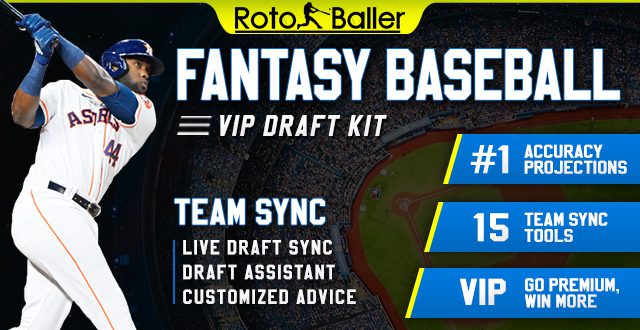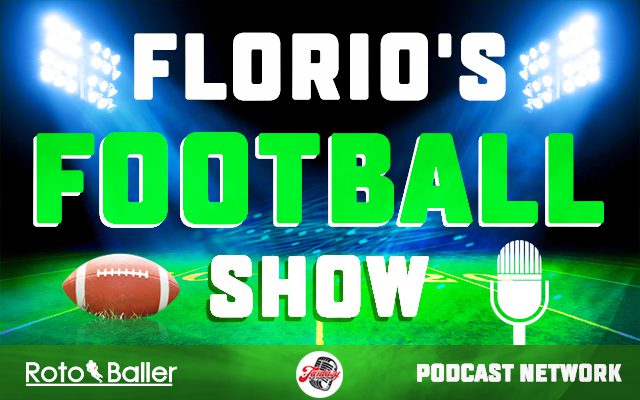
Missing bats is the #1 way a pitcher can control his own fate. If hitters make contact, the pitcher is largely at the mercy of the atmosphere, the weather, the ball park, the ability/work ethic of his fielders, and sometimes just sheer luck. This is ultimately why strikeouts are so important.
By looking at pitchers with positive trends in their strikeout rate n week 8, we can spot improving or declining pitchers. If the K-rate is improving, but the ERA and WHIP are less than ideal, it can present a buying opportunity. On the flip side, you may want to sell a pitcher with a declining K-rate, if he wasn't supposed to be that good to begin with.
This particular article will focus on two strikeout rate risers and two fallers, and make an attempt to determine how you should treat each pitcher.
Be sure to check all of our fantasy baseball lineup tools and resources:- Fantasy baseball trade analyzer
- BvP matchups data (Batter vs. Pitcher)
- PvB matchups data (Pitcher vs. Batter)
- Who should I start? Fantasy baseball comparisons
- Daily MLB starting lineups
- Fantasy baseball closer depth charts
- Fantasy Baseball live scoreboard
- Fantasy baseball injury reports
K-Rate Risers and Fallers - Premium Tool
Identifying top strikeout rate risers and fallers for each week can help you spot the best pickups before your competition. RotoBaller's Premium K-Rate Risers and Fallers tool has you covered every day. As thoughtful fantasy baseball players, we won't lead you astray. This tool will soon be active once we have a large enough sample size in the season to be considered reliable.
This type of data is available as part of our Premium MLB Subscription. Don't settle for basic stats and surface-level advice from other sites. RotoBaller brings you advanced statistics and professional analysis that you need to win your fantasy leagues and DFS games, because we're ballers just like you. We are your secret weapon!
K-Rate Risers
Tyler Anderson, Colorado Rockies
Season K-Rate: 24%, Last 30 K-Rate: 27%
Tyler Anderson came up to the Rockies last season after pitching only 17 innings in Triple-A, and surprised in his 19 major league starts. He held a 3.54 ERA and 1.29 WHIP, with a FIP/xFIP of 3.59/3.64 to back up his performance. Though he spent he majority of his time pitching at home, he only had four outings allowing four or more runs, and never had a month with an ERA over 3.96. Surprisingly, he found a way to pitch better at Coors Field (3.00 ERA) compared to the road (4.71). He struggled mightily through the first month of this season, with a 7.71 ERA, 1.58 WHIP, and 17.5% K% over his first six starts.
Things have begun to look up for Anderson during the month of May. Over four starts, he holds a 2.55 ERA, 1.14 WHIP, and a 32% K%. He has thrown three quality starts, striking out 32 hitters to only seven walks. His BABIP is at .316 during that span, which is right in line with his .315 career average so he isn’t getting overly lucky with these results. He has been mixing in his changeup more this season at the expense of his cutter this season, resulting in the swinging strike rate (SwStr%) for each pitch improving. Anderson’s slider has had more of a bite on it this season as well, resulting in the contact % for the pitch dropping from 84.8% to 65.5%. The only area he has been lacking in over the past four starts is his HR/FB, which is at 27.3% over that span. Anderson posted a below-average 12.4% HR/FB last season, so it is possible they remain an issue moving forward.
The changes we’ve seen from Anderson over his past four starts are certainly sustainable, given how well he performed last season. He is still available in a ton of leagues thanks to his sluggish start, but won’t be for long if he keeps pitching like he did last season.
Verdict: Buy
Charlie Morton, Houston Astros
Season K-Rate: 26%, Last 30 K-Rate: 30%
With the way Charlie Morton is throwing this season, you would think he’s a young flamethrower and not a veteran in his 10th major league season. Through his first nine seasons he averaged 91.7mph on his fastball, but this season he has averaged 95.3mph, touching 98mpg at times. It has resulted in a career-high 10.14 K/9 with a 3.86/3.41 FIP/xFIP. Morton has only averaged about 99 innings pitched per season during his career, which has been the result of injuries and not due to a lack of talent. This season he is showing how healthy he is by displaying his newfound velocity.
Morton has also been throwing his curveball more this season, which was already one of his better pitches. It has held opposing hitters to a .145 BAA this season, with a career-high 20.9% SwStr% and a career-low 50% contact %. His velocity has been consistent to this point, so there is no reason to expact a drop off there. He has allowed a career-high 37.6% hard contact %, but has been able to keep balls on the ground and limit fly balls with a 51.3% GB% which ranks 15th among all starters. Where Morton has struggled the most is getting deep into ballgames; he gets progressively worse as the game goes on, but the third time through the order is especially bad. The first time through the order he has a 1.19 ERA, with a .227/.227/.277 batting line against. The second time he has a 2.70 ERA, followed by a 10.43 ERA the third time through with a .323/.408/.623 line against him.
He fired seven innings of two-run ball against the Tigers in his last start, so he can be successful despite his early season struggles. While he is healthy and striking people out at a high clip he is worth buying. Playing on a loaded Astros team, he has a chance to rack up plenty of wins this season.
Verdict: Buy
K-Rate Fallers
Wade Miley, Baltimore Orioles
Season K-Rate: 23%, Last 30 K-Rate: 16%
Wade Miley has been impressive in his first full season with the Baltimore Orioles, starting off with a 2.59 ERA over his first nine starts. He is sporting a career-high 23.2% K% while holding hitters to a .231 BAA. Miley has typically been a hot starter in his career; April is his second-best month according to ERA. During the month of May his ERA has stayed solid, but his strikeouts have dipped down from 29.7% to 13.3%. During each month however, he has walked about five hitters per nine innings and has a 1.44 WHIP on the season.
Miley’s ERA this season is not supported by his FIP/xFIP, which are at 4.41/4.00 respectively. He has done a better job getting soft contact on his pitches this season, but at the same time is allowing a career-high 34.6% hard contact %. Like Charlie Morton he has done a good job at keeping the ball on the ground, with a 51.5% GB%, but his 17.6% HR/FB leaves much to be desired. In 11 starts with the Orioles last season his HR/FB was 17.5%, so we may not see that change much over the remainder of the season. Unlike Morton, Miley does not possess any major changes in his approach that support him maintaining his 2.59 ERA.
Miley is a prime sell-high candidate if you’re an owner enjoying his hot streak. If you can sell him to the most SP-needy team in your league (there’s bound to be one team riddled with DL stints), I would before he begins falling back down to earth.
Verdict: Sell
Jerad Eickhoff, Philadelphia Phillies
Season K-Rate: 21%, Last 30 K-Rate: 17%
Jerad Eickhoff may not be the most exciting Phillies pitcher with Aaron Nola and Vincent Velasquez on the roster, but he’s been the most consistent pitcher of the bunch since last season. In 2016 he held a 3.65 ERA and 1.04 WHIP over 197 1/3 innings, his first full season in the majors. He hasn't brought that same success into 2017, especially in the control department. After holding a BB% of 5.2% last season it is up to 7.9% now, lowering his K/BB to to 2.61. His past five starts have been especially poor; he has a 6.67 ERA with four or less strikeouts in three of those outings.
The good news for Eickhoff is it doesn't look like much has changed with his pitching profile; his selection and velocities are similar, and he has allowed a similar GB% and FB% this season. His hard contact rate is down this season, but his soft contact rate has fallen down to only 14.1%, which is the ninth lowest rate among starters this season. Though his current K% is exactly where he ended at last season at 20.6%, he is striking out more hitters per nine innings this season at 8.19. Last season on the whole Eickhoff performed well, but from July to August he held a 4.66 ERA with a 6.99 K/9. As a young pitcher he will go through hills and valleys in his development, but as long as he can reclaim his control he should have no issue holding a mid-3.00 ERA the remainder of the season.
If there is a concerned Eickhoff owner out there, this would be the time to buy him. He has been struggling lately, but if you can buy low on him and hold him through this stretch you'll have yourself a nice middle of the rotation arm for the remainder of the season.
Verdict: Buy
More Risers and Fallers
Premium Tools & DFS Research
Get a free trial of our powerful MLB Premium Tools. Our famous DFS Optimizer & Lineup Generator, daily Matchup Ratings, expert DFS Lineups/Cheat Sheets, and more.
 RADIO
RADIO



























